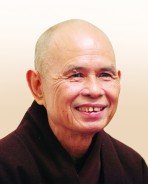
Mr Pro-Chancellor,
Thich Nhat Hahn or Thay (teacher in Vietnamese as his friends and students call him) is a world renowned Buddhist monk - a spiritual leader, peace activist, scholar, poet and writer. He is one of the most respected Zen Masters in the world today.
He was born in Vietnam in 1926 and became a monk at the age of sixteen. He was fully ordained in 1949. In the following years he was active as a teacher and writer.
When, however, the Vietnam war broke out in 1954 Buddhist monastics were confronted with the question whether to adhere to their contemplative lives or pursue a more active role. Thay chose the latter. He helped to found the "Engaged Buddhist" movement which melded meditative practices with active non-violent civil disobedience. He worked unstintingly for reconciliation between North and South Vietnam and lobbied world leaders to put an end to the conflict.
In 1961 he travelled to the United States to study comparative religion at Princeton University and the following year went to teach and research Buddhism at Columbia University.
Thay returned to Vietnam in 1964 and founded the Van Hanh Buddhist University in Saigon. He also established the School of Youth Social Service, a grass-roots relief organisation that trained young people practically and spiritually to be sent out to rebuild bombed villages, set up schools and medical centres, resettle homeless families and organize agricultural cooperatives. Rallying some 10,000 student volunteers, the Service based its work on the Buddhist principles of non-violence and compassionate action.
In 1966, whilst the war was still raging, he again travelled to the United States and Europe to make the case for peace. It was during this time that he was nominated for the Nobel peace Prize by Martin Luther King who referred to him as "an apostle of peace and non-violence". When the war ended with the signing of the Paris Peace Accords in 1973 he was denied the right to return home because he had spoken out against the violence and he began a thirty-nine year exile in France.
Since then his life has been devoted to the work of inner transformation for the benefit of individuals and society. This involves aiming at achieving a true state of "mindfulness". Mindfulness is the energy of being aware and awake to the present moment. It is the continuous practice of touching life deeply in every moment of daily life. To be mindful is to be truly alive, present and at one with those around you and with what you are doing.
In 1975 Thay established the Sweet Potato Community near Paris and in 1982 the community moved to its present home in South West France under its new name - Plum Village. Plum Village aims at providing a community where people involved in social transformation can come for rest and spiritual nourishment. Under the spiritual leadership of the Zen Master it has grown from a small rural farmstead to become today's largest and most active Buddhist monastery.
Mr Pro-Chancellor, together with the Vice Chancellor, I had the privilege of visiting and staying at Plum Village last week. It is indeed an idyllic location situated among rolling hills with a wonderful ambiance of peace and contentment. We received a most warm welcome from the Zen master and his fellow monastics and, despite the brevity of our stay, were very much touched and inspired by the master's teaching and the enthusiasm and dedication of his followers.
In his teachings he places much emphasis on the importance of meditation as a healing process. He has said:
"Meditation can help us embrace our worries, our fear, our anger; and that is very healing. We let our own natural capacity for healing do the work".
And:
"To meditate means to go home to yourself. Then you know how to take care of the things that are happening inside you and you know how to take care of the things that happen around you".
He also counsels against allowing suffering to overcome the capacity for happiness.
"The seeds of suffering may be strong, but don't wait until you have no more suffering before allowing yourself to be happy".
Thay has been invited to address the United States Congress and the English House of Lords and was listed by Time Magazine as one of the "Heroes of Asia". He has also been a frequent visitor to this University where he has given several very popular lectures hosted by the Centre for Buddhist Studies.
Mr Pro-Chancellor, Zen Master Thich Nhat Hahn has dedicated his life to humanitarian work and world peace. He is a truly remarkable and inspirational man.
I would like to end by quoting his moving and insightful comment on the miracle of life.
"People usually consider walking on water or in thin air a miracle. But I think the real miracle is not to walk on water or in thin air but to walk on earth. Every day we are engaged in a miracle which we don't even recognise: a blue sky, white clouds, green leaves, the black curious eyes of a child. All are miracles".
Mr Pro-Chancellor, it is my honour and privilege to present to you Zen Master Thich Nhat Hahn for the award of Doctor of Social Sciences honoris causa.
Citation written and delivered by Professor Michael Wilkinson, the Public Orator of the University.
For the thank you message by Zen Master Thich Nhat Hanh, please visit: http:www.cpao.hku.hk/media/140318_Master_Thich_Nhat_Hanh.speech.doc




